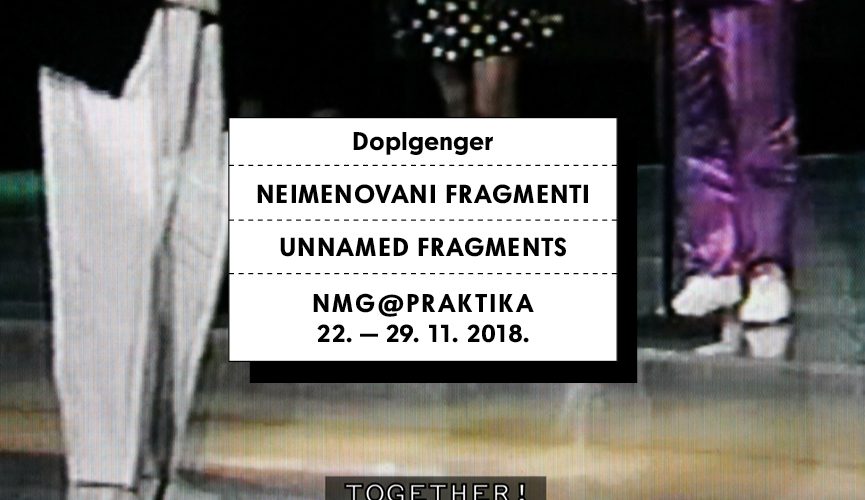Doplgenger – Unnamed Fragments + Curatorial School
EXHIBITION OPENING:
Thursday, 22nd November 2018, at 20:00
NMG@PRAKTIKA, Klub KOCKA, Dom mladih Split, Ulica slobode 28
My first encounter with the Doplgenger artist duo came about the time when we were preparing the large show called State Abed in 2014 in the Museum of Fine Arts in Split. In the group exhibition consisting of 24 works from around the world, we decided to show a part of their interesting multiyear project Unnamed Fragments, and decided then to present this project in a solo show, while presenting the idea, concept, creation and development of the project to the audience in a series of lectures in our Curating school. The exhibition Unnamed Fragments by the Doplgenger artist duo, represents a series of works created from 2011 within a research project of the same name. A series of media fragments in different formats addresses the “unforgettable” of the collective and personal, an intimate memory of the last decades of Yugoslavian history, mostly constructed through TV images. The project Unnamed fragments deals with the politics of media images which participated in the creation of historical narratives in the space of former Yugoslavia in the period between 1980 and 2000. The works in the series perform the context of the media content anew, but now expressing that which was previously invisible and suppressed, that which remained marginalized in the media flow, or considered ephemeral. Through this series of works the Doplgenger artist duo analyze and deconstruct these amalgams of images and sounds of the past in the present moment, while confronting and actualizing them.
The exhibition consists of:
• Unnamed fragments #4, Five-channel video installation, 2015. In the movie Les Carabiniers by Jean-Luc Godard (1963), the warriors return home with postcards from all over the world and tell their wives: “we have brought the treasures of the world”. Geography is taught with the help of postcards and maps, and the world is conquered. The postcards of Yugoslavian and world sites served the information program of the Radio Television Yugoslavia as a visual background for the segments for which there was no film records from the location itself. They have remained the same over time, while the content of the sound commentary changed.
• Unnamed fragments #3, Experimental video (6min 20 sec, loop), 2015. “There is no document of culture which is not at the same time a document of barbarianism” – Walter Benjamin, Theses on the philosophy of history. The Eurovision contest of 1990 represented the 35th installment of the competition. It was held in Zagreb, on May 5th 1990. In April and May of the same year, first state elections were held in Croatia, followed by political debates on the ethnic relationship between Croats and Serbs in the Federal Republic of Croatia. This resulted in the “Balvan revolution” which would later turn into the Homeland war. Unnamed fragments #3 position this event in a wider European context.
• Unnamed fragments #2, Experimental video (6min 10 sec, loop), 2014. “Better life” is a Yugoslavian TV show produced by Belgrade Television, which was immensely popular in the former Republic of Yugoslavia. The show, which had elements of soap opera, comedy and drama, had 82 episodes and was aired between 1987 and 1991. The show is considered the most popular series in the former Yugoslavia. Unnamed fragments #2 reveal the images which depict rapid political and economic changes in the country in the 80s and the beginning of the 90s.
• Unnamed fragments #1, Experimental video (6min 50 sec, loop), 2012. On June 28th 1989, “a people happened” on Gazimestan, and we witnessed it thanks to direct TV coverage. This event, foreshadowing the breakdown of Yugoslavia and the bloodbath which would be its civil war, history remembers in the image of Slobodan Milošević and the message of his speech. What history would leave out is the counter image of the popular representation and the expression of the people. Official, mostly media, memory and document erased both these marks. Unnamed fragments #1 vivisect the archive footage in order to point out the invisible and deconstruct the memory.
Natasha Kadin, curator
– – –
CURATORIAL SCHOOL /
Collective curatorial practices
Beton Kino, Dom mladih Split. 23. — 25. 11.
Friday / November 23rd
18 — 20: Images of the past as images for the future
20 — 22: The collective body of Yugoslav movie
Sunday / November 25th
18 — 20: The concept map of joining of artists
20 — 22: Discursive articulations of joining of artists< ?p>
– – –
The Doplgenger artist duo consists of Isidora Ilić and Boško Prostran, film/video artists who live and work in Belgrade. Doplgenger works deal with the relationship between arts and politics while questioning the regime of moving images and the modes of their reception. Building on the tradition of experimental film and video, Doplgenger intervene on the existing media productions or produces in the form of a film essay. Although their primary medium is the moving image, their practice involves texts, spatial installations, performances, lectures and discussions. Works by the Doplgenger duo have been presented both at home and abroad, on solo and group shows, as well as film/video festivals. They are the recipients of the Politika award for best exhibition of 2015.

